
Future Internet
Scope & Guideline
Empowering Research in the Evolving Internet Landscape
Introduction
Aims and Scopes
- Internet of Things (IoT) and Edge Computing:
Research in this area revolves around the integration of IoT devices with edge computing to enhance data processing capabilities and optimize resource allocation. - Blockchain Technology and Security:
The journal frequently publishes studies on blockchain applications, focusing on security, privacy, and data integrity in various sectors, including finance and healthcare. - Artificial Intelligence and Machine Learning:
A significant focus is placed on the application of AI and machine learning techniques for data analysis, predictive modeling, and automation across different domains. - Smart Cities and Urban Computing:
Papers often explore the development of smart city technologies, addressing challenges related to urbanization, sustainability, and the implementation of intelligent infrastructure. - Network Protocols and Optimization:
The journal covers advancements in network protocols, including congestion control, routing algorithms, and performance optimization for next-generation networks. - Cybersecurity and Privacy:
Research related to cybersecurity threats, mitigation strategies, and privacy-preserving technologies is a core area, addressing vulnerabilities in digital systems. - Human-Computer Interaction and User Experience:
Studies in this scope focus on enhancing user experience through innovative interfaces and interactive systems, particularly in educational and healthcare settings.
Trending and Emerging
- Federated Learning and Privacy Solutions:
Increasing focus on federated learning demonstrates a trend towards privacy-preserving machine learning models that allow for collaborative data analysis without compromising sensitive information. - Sustainable and Green Technologies:
Emerging themes in sustainability reflect a growing emphasis on eco-friendly technologies and practices, particularly in the context of smart cities and energy-efficient systems. - Human-AI Collaboration:
Research is trending towards enhancing human-AI collaboration, exploring how AI can assist in decision-making processes across various fields, including healthcare and education. - Decentralized Finance (DeFi) Innovations:
The rise of decentralized finance is evident in recent publications, signifying a shift towards blockchain-based financial systems that promote transparency and accessibility. - 5G and Beyond Technologies:
As the rollout of 5G progresses, research focusing on its applications, challenges, and integration with IoT devices is gaining momentum, reflecting its transformative potential. - Digital Twins and Smart Manufacturing:
The application of digital twin technology in manufacturing is a growing area of interest, emphasizing real-time monitoring and optimization of industrial processes. - Augmented and Virtual Reality Applications:
There is a notable increase in research surrounding the use of augmented and virtual reality in educational and training contexts, highlighting their potential to enhance learning experiences.
Declining or Waning
- Traditional Networking Techniques:
There is a noticeable decline in papers focusing on traditional networking techniques without the integration of modern technologies like SDN (Software Defined Networking) or NFV (Network Function Virtualization). - Static Cybersecurity Measures:
The shift towards dynamic and adaptive cybersecurity solutions is leading to a decrease in publications centered around static security measures and traditional firewall approaches. - Generalized AI Applications:
Research that broadly applies AI without specific contextual frameworks, such as in business or healthcare, is becoming less frequent as more targeted studies emerge. - Legacy Systems Integration:
Interest in integrating outdated systems with new technologies is waning, as the focus shifts towards developing entirely new architectures that leverage contemporary advancements. - Manual Data Processing Techniques:
With the rise of automation and AI, there is a marked decline in research related to manual data processing techniques, reflecting a broader trend towards efficiency and automation.
Similar Journals
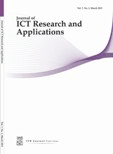
Journal of ICT Research and Applications
Exploring New Horizons in ICT ApplicationsJournal of ICT Research and Applications, published by ITB JOURNAL PUBL, is a prominent open-access journal since 2013 that serves as a vital platform for disseminating innovative research in the fields of Information and Communication Technology. Based in Indonesia, this journal provides a valuable resource for researchers, professionals, and students interested in the evolving landscape of computer science, electrical engineering, and information systems. Though currently placed in Q4 across its relevant categories for the year 2023, the journal aims to enhance its visibility and impact within the academic community by inviting high-quality submissions that explore interdisciplinary approaches and novel applications of ICT. With its transparent open-access model, the Journal of ICT Research and Applications ensures that research findings are readily accessible, fostering collaboration and knowledge sharing among scholars worldwide. Its commitment to advancing ICT research and practices solidifies its role as a meaningful contributor to these dynamic fields.

Journal of Internet Services and Applications
Advancing knowledge in Internet technologies and applications.Journal of Internet Services and Applications is a leading scientific platform dedicated to the dynamic and evolving field of Internet technologies and applications, published by SOC BRASILEIRA COMPUTACAO. Since its establishment in 2010, the journal has transitioned to an Open Access model, ensuring that research is freely available to a global audience, fostering innovation and collaboration among scholars. With an impact factor solidifying its credibility in the academic community, the journal is ranked Q2 in Computer Networks and Communications and Q3 in Computer Science Applications as of 2023, demonstrating its relevance and contribution to these critical fields. The journal covers a wide array of topics including network design, application development, and the intersection of technology and society, making it a vital resource for researchers, professionals, and students alike. With a commitment to fostering cutting-edge research, the Journal of Internet Services and Applications remains a vital conduit for knowledge and advancement in the rapidly evolving domain of Internet services.
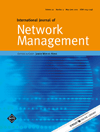
International Journal of Network Management
Leading the Charge in Network Management Research.The International Journal of Network Management, published by WILEY, has been an authoritative resource in the field of network management since its inception in 1991. With a strong academic reputation reflected in its 2023 category quartiles placing it in Q2 for both Computer Networks and Communications and Computer Science Applications, this journal is ranked within the top tiers of its categories, underscoring its pivotal role in disseminating high-quality research. The journal aims to provide insights into the latest advancements in network management strategies, technologies, and applications, catering to the needs of researchers, professionals, and students alike. By embracing rigorous peer-review processes and a commitment to publishing cutting-edge studies, it serves as a crucial platform for the exchange of knowledge and innovation within the network management community. Explore the wealth of resources and join the dialogue among a diverse audience striving to shape the future of computer networks and applications.

Digital Communications and Networks
Innovating the future of communication technologies.Digital Communications and Networks, published by KEAI PUBLISHING LTD, stands at the forefront of research in the rapidly evolving fields of communication, computer networks, and hardware architecture. Since its inception in 2015, this open access journal has been committed to disseminating high-quality, peer-reviewed articles that contribute to technological advancements and academic discourse in these critical domains. With an impressive Impact Factor and achieving Q1 Quartile rankings in its relevant categories for 2023, it has established itself as a vital resource for researchers, professionals, and students aiming to stay ahead in a competitive landscape. The journal's robust standing is reflected in its notable Scopus rankings, underscoring its influence in Computer Science and related fields. As we look toward the future, the journal continues to invite innovative research that shapes the digital communication landscape until 2024 and beyond.

KSII Transactions on Internet and Information Systems
Unveiling Insights in the Evolving Digital Landscape.KSII Transactions on Internet and Information Systems is a leading academic journal dedicated to advancing the fields of Internet technology and information systems. Published by the KSII-Kor Soc Internet Information, this journal has established itself as a significant contributor to research since its inception in 2007, with a focus on innovative solutions and methodologies in computer networks and communications as well as information systems. With a Category Quartile of Q3 in both fields for 2023, it ranks in the 44th percentile among its peers according to Scopus, making it a reputable platform for authors to share their findings. While available in print, the journal also promotes open access, ensuring broad dissemination of research findings. The editorial team is committed to maintaining high scholarly standards and relevance, inviting contributions from researchers, professionals, and students eager to push the boundaries of knowledge in today's rapidly evolving digital landscape. For those engaged in or studying these dynamic fields, the KSII Transactions on Internet and Information Systems remains an invaluable resource for cutting-edge research.

IEEE Open Journal of the Computer Society
Elevating Research Standards in a Rapidly Evolving FieldIEEE Open Journal of the Computer Society is an esteemed open-access journal dedicated to advancing the field of computer science. Published by IEEE-INST ELECTRICAL ELECTRONICS ENGINEERS INC since 2020, this journal promotes innovative research and scholarly communication in a rapidly evolving technological landscape. With a notable Q1 ranking in the Computer Science (miscellaneous) category and a high Scopus percentile of 92, it serves as a premier platform for disseminating cutting-edge findings and interdisciplinary studies. The journal is committed to facilitating unrestricted access to valuable insights, fostering collaboration among researchers, professionals, and students alike. As it continues to publish impactful articles through 2024 and beyond, the IEEE Open Journal of the Computer Society remains a vital resource for anyone interested in the latest trends and developments in computer science.

Computers
Pioneering Research in Computing and CommunicationComputers is a leading journal published by MDPI, dedicated to advancing research in the fields of computer networks and communications, as well as human-computer interaction. Since its inception in 2012, it has established itself as a vital resource for scholars and practitioners, achieving an impressive Q2 ranking in Computer Networks and Communications and a Q3 ranking in Human-Computer Interaction as of 2023. The journal is indexed in Scopus, highlighting its relevance with a rank of #135/395 and #72/145 in their respective categories. Published in Switzerland, this open-access journal ensures widespread dissemination of research findings, supporting the global academic community in enhancing technologies relevant to computer science. Access options are available, fostering an environment where knowledge is shared freely. With an emphasis on innovation, redesign, and collaboration between humans and technology, Computers plays a crucial role in shaping the future of digital interactions.
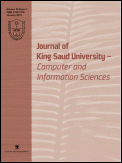
Journal of King Saud University-Computer and Information Sciences
Leading the Charge in Cutting-edge ResearchJournal of King Saud University-Computer and Information Sciences, published by ELSEVIER, is a prestigious open-access journal focusing on the rapidly evolving fields of computer science and information technology. Since its inception in 1996, this journal has provided a platform for high-quality research and innovative ideas, promoting the dissemination of knowledge to a global audience. With a remarkable impact factor and ranked Q1 in the Computer Science (miscellaneous) category as of 2023, it stands among the top 11% of journals in its field, reflecting its commitment to excellence and relevance. The journal proudly carries the ISSN 1319-1578 and E-ISSN 2213-1248, and it is based in Saudi Arabia while being part of a global academic network. With a Scopus rank of #26 out of 232 in general computer science, the Journal of King Saud University-Computer and Information Sciences is an essential resource for researchers, professionals, and students seeking to stay at the forefront of technological advancement. As it continues to thrive through 2024, it invites contributions that will shape the future of computing and information sciences.
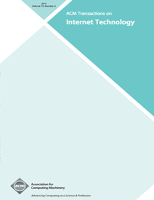
ACM Transactions on Internet Technology
Connecting Theory with Practical ApplicationsACM Transactions on Internet Technology, ISSN 1533-5399 (E-ISSN 1557-6051), is a premier journal published by the Association for Computing Machinery (ACM) that has made significant contributions to the field of computer science, particularly in the areas of computer networks and communications. Established in 2001, this journal has swiftly ascended to a prestigious Q1 ranking in its category as of 2023, demonstrating its influence within the scientific community, evidenced by its high Scopus rank of #41 out of 395 journals and a remarkable 89th percentile ranking. The journal serves as a vital platform for researchers, professionals, and students, offering a spectrum of scholarly articles that explore advancements in Internet technology, design, applications, and performance. With a commitment to high-quality research, ACM Transactions on Internet Technology is dedicated to fostering knowledge exchange and innovative problem-solving in an ever-evolving technological landscape. Readers can look forward to insights into both theoretical frameworks and practical implementations, making it an essential resource for cutting-edge research and developments in the digital frontier.
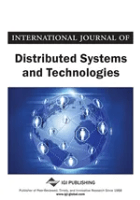
International Journal of Distributed Systems and Technologies
Unveiling Insights into the World of Distributed Technologies.Welcome to the International Journal of Distributed Systems and Technologies, a prominent academic platform published by IGI Global dedicated to advancing the field of distributed systems and technologies. With an ISSN of 1947-3532 and an E-ISSN of 1947-3540, this journal, established in 2010 and continuing through 2024, offers a unique venue for researchers, professionals, and students to disseminate their findings in the realms of computer networks, communications, hardware, and architecture. Despite its current placement in the Q4 quartile for both computer networks and communications and hardware and architecture categories in 2023, the journal is committed to fostering innovative solutions and interdisciplinary collaboration that can drive future advancements. Although not open access, contributions to this journal not only receive rigorous peer review but also have the potential to significantly impact the community, underscored by a focus on applicable research that addresses the emerging challenges in technology. As part of a rich repository, the journal invites you to explore its latest issues and join in shaping the future of distributed systems.